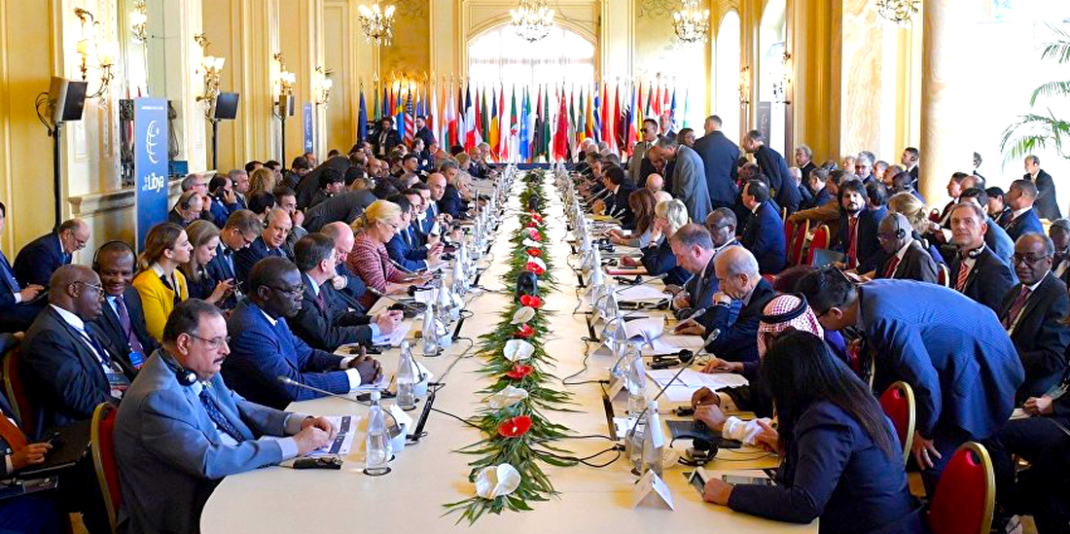International Organizations at Odds with Global and Regional Players
By Wolfgang Mühlberger
 Since Colonel Gaddafi’s demise in late 2011, Libya has embarked on a political transition marked by conflict and uncertainty. The meddling of external players has increased fragmentation and polarization along multiple emerging fault lines.
Since Colonel Gaddafi’s demise in late 2011, Libya has embarked on a political transition marked by conflict and uncertainty. The meddling of external players has increased fragmentation and polarization along multiple emerging fault lines.
PART (II)
2.1 – International and regional organizations: the fragmentation of diplomacy
The Lebanese scholar and diplomat Ghassan Salamé was nominated the fourth United Nations Special Representative of the Secretary General for Libya in June 2017, taking over the task from Martin Kobler, whose main legacy has been the December 2015 Skhirat Agreement or Libyan Political Agreement (LPA).
UN initiatives for conflict management and stabilization in Libya nominally enjoy the widest possible support at the international level. While focusing mainly on the political element of crisis management, UN efforts also include complementary dossiers handled by the UN Support Mission in Libya (UNSMIL).
However, efforts are generally hampered by two phenomena: one domestic, the other regional and international.
On the domestic level, the Skhirat Agreement (aka LPA) could not be implemented as planned, resulting in a political stalemate, with adverse effects in the security sector, in particular in the essential fields of disarmament, demobilization and reintegration (DDR) and security sector reform (SSR).
The resulting deadlock also motivated certain external actors in their drive for a military solution to overcome political cleavages, further undermining the delicate political process and the UN balancing act.
However, against all odds, on 20 September 2017, Salamé introduced his “Libya Action Plan” at the UN General Assembly, including a timeframe and a thematic roadmap towards elections, in order to supersede interim bodies and settle for a more entrenched political representation.
The African Union (AU) has also tried to play a coordinating role to advance conflict resolution in Libya by convening a number of meetings.
The Brazzaville summit in September 2017 has been the most recent example of these efforts. Under the auspices of the Congolese President Denis Sassou Nguesso it gathered representatives of Libya’s major power centres:
the chairman of the Libyan Presidential Council and Prime Minister of the GNA, Fayez al-Sarraj; the chairman of the Tobruk-based HoR, Aguila Saleh; the High Council of State President, Abdulrahman Sewehli; and LNA leader Field Marshal Khalifa Haftar, affiliated with the Tobruk parliament, who however was ultimately axed from the list of invitees.
Despite such visible activities, AU policy on Libya suffers from an internal multiplication of uncoordinated bodies and initiatives, as highlighted by a recent report from the Institute for Security Studies (ISS) in Johannesburg.
Effectively, three bodies engage with the Libyan question: the AU High-Level Committee on Libya headed by President Sassou Nguesso; the High Representative for Libya, former Tanzanian president Jakaya Kikwete; and the AU chair, Guinean President Alpha Condé.
Nevertheless, summits like the ones in Brazzaville can support and facilitate peace-making efforts, as conflict parties convene and exchange their positions.
An underlying motivation for the AU proper might be related to funding, as Gaddafi’s Libya had been one of the most generous purveyors of financial support to the pan-African organization.
Besides regular calls for a qualified end to the UN arms embargo on Libya, echoing demands from Egypt, the UAE and the Libyan government, the Arab League recently called on international actors to free-up frozen Libyan assets held abroad.
Diplomatic efforts by the Arab League are led by the Special Representative of the Arab League Secretary-General in Libya, Salaheddine Jamali.
Yet, to date, the Arab League has not presented an initiative of its own. Most obviously, this reflects the difficulty in reaching a shared Arab position, due to different visions of Arab League member states on how to handle the Libyan conflict.
Such internal cleavages were recently exemplified by tensions between Egypt and the Emirates on one side, and Qatar on the other, all three deeply involved in Libya.
The European Union, one of Libya’s closest geographic neighbours, is operating on different levels and with a variety of instruments to increase stability in Libya and to advance political consolidation.
The EU’s priority is stemming the flow of illegal immigrants to southern European shores and pre-empting the spread of jihadi terrorism, both across North Africa and in Libya itself.
Fear of foreign fighters travelling to Europe from Libya (and vice versa) has further increased the European focus on the country. The EU’s policies are embedded within the wider framework of the EU’s new Global Strategy released in June 2016 and the new resilience narrative, which forms a major pillar of the EU’s foreign and security policy and informs certain aspects of the European Neighbourhood Policy.
While the EU supports the UN-led political process and the institutions established under the LPA, it is simultaneously seeking to enhance security cooperation under the framework of Common Security and Defence Policy (CSDP) missions such as EUNAVFOR Med Operation Sophia and EUBAM Libya.
However, due to the lack of Libyan institutional capacity, one of the challenges since late 2011 has been the identification of relevant authorities that can act as counterparts, as well as effective cooperation with those identified. This has curtailed the impact of such initiatives as the ongoing cooperation with Libya’s coast guard.
Given the slow and largely ineffective process of the political transition, EU policy has in effect moved to prioritize security – counter-terrorism and energy supplies – and other related interests (control of migration flows), a trend reflected in the latest EU policies towards Libya.
In addition to these four international, regional and multilateral organizations, an umbrella group called the Quartet on Libya has been set up based on an earlier tripartite effort. The Quartet conceives of itself as an additional high-level tool for co-ordination between the four above-mentioned bodies, helping to streamline activities in the spirit of UN-led efforts.
“Joint communiqués” have been issued following the gatherings (the most recent dating from 22 September 2017, following the UN’s General Assembly), yet the Quartet is not considered an instrument for starting initiatives of its own making, or for implementing specific tasks or activities.
2.2 – Immediate Arab neighbours: positions from non-intervention to proxy warfare
Libya’s upheaval has touched Tunisia in multiple ways since 2011: a significant return of expatriate workers, the influx of hundreds of thousands of – mostly wealthy – Libyan nationals, the encroachment and transborder activity of ISIS-affiliated militias, and other more generic border security issues.
Tunisia has a primary interest in Libya’s stability, a crucial condition to revive economic links, pre-empting jihadist spillovers and countering illicit commerce along its south-eastern border. With limited means and a strong focus on its own ongoing domestic transition, Tunisia has opted for multilateral diplomacy as means of conflict resolution.
By offering its good offices, Tunisia has provided a platform for meetings of regional players and Libyan conflict parties alike. Lately, the meetings of two Libyan committees (representing the HoR and the GNA) convened in Tunis, in order to initiate the follow-up to UN envoy Ghassan Salamé’s Libya Action Plan, i.e., to start discussing possible amendments to the LPA.
More meetings are to follow, as this process will require finding consensus. Earlier in 2017, a five-point declaration was released following a tripartite summit in Tunis, a sign of intra-regional coordination efforts. Also, Tunisia’s president Beji Caid Essebsi met with the League of Arab States special envoy for Libya prior to the Tunis summit, to discuss his own Libya initiative.
Algeria’s approach to managing the protracted conflict in Libya also favours diplomatic tools, based on the country’s traditional ideology-based non-interventionist dogma.
Furthermore, its own experience of a mujahideen-driven insurrection in the 1990s, and major security concerns linked to trans-Saharan jihadist-criminal networks, including Al-Qaeda in the Islamic Maghreb, underline the importance of stability in Libya.
However, despite its size and military weight, Algiers has lately played a less visible role than its smaller neighbour Tunisia. A central player in Algeria’s diplomatic efforts is Abdelkader Messahel, Algerian Minister of Maghreb, African Union and Arab League Affairs.
Yet, despite Algeria’s non-interventionist posture and Algeria’s support for the GNA, his visit to Libya in April 2017 led to mediatized controversy.
Algeria’s ultimate strategic goal is to avoid a failed state on its eastern flank, which would put at risk its own stability and regime survival. It is therefore vitally interested in the success of the ongoing institution-building efforts.
Even though Egypt also endeavours to re-establish viable statehood in Libya, its approach diverges strongly from its Maghreb neighbours. Cairo has not only become a safe haven for Gaddafi loyalists, based on decades of close-knit security cooperation between Gaddafi and Mubarak, it has also evolved into Khalifa Haftar’s lifeline, providing the LNA with much-needed training, equipment and political support.
Hence, its tactics include both political initiatives aimed at conflict resolution (including tribal politics), and indirect military involvement via allied armed units. This dual strategy also has institutional implications: the ministry of foreign affairs expresses rhetorical support to the UN’s political process aimed at achieving an inclusive political settlement, whereas President Sisi and the military are propping up the LNA to achieve a national agreement by other means.
***
Wolfgang Mühlberger is a senior research fellow in the the European Union research programme at The Finnish Institute of International Affairs-FIIA in Stockholm. He held positions at the Austrian National Defence Academy, with the Economist Intelligence Unit and the Austrian Ministry of Foreign Affairs. He studied Arabic and Islamic Studies as well as Economics and Business Administration in Vienna, and was a Visiting researcher at the Institute for National Security Studies (INSS) in Tel Aviv (2011) and at NATO Defense College in Rome (2012). His research focuses on post-revolutionary Libya, the civil war in Syria, the Israeli-Arab conflict and EU external relations in the southern Mediterranean.
___________
Source: Chapter 3 of ‘Search for Stability in Libya .. OSCE’s Role between Internal Obstacles and External Challenges. Edited by Andrea Dessì and Ettore Greco.






